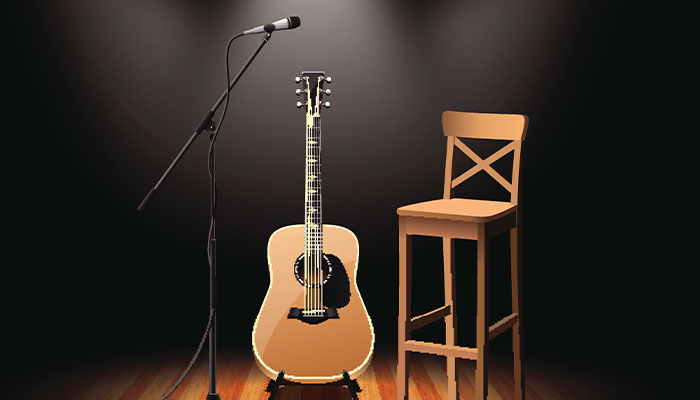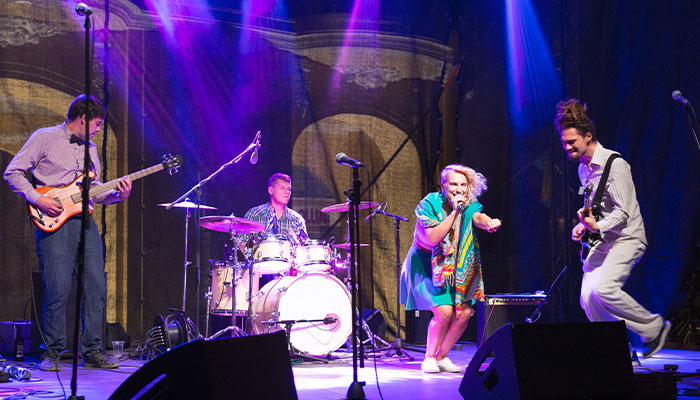Australian policymakers need to do more to revive the music industry during the COVID-19 pandemic as sentiment about future income and employment in the sector remains low, say Macquarie University researchers.

Show stopper: Many musicians feel despondent about the future, the Macquarie Business School survey found, and many consumers are apprehensive about attending live music events in the future.
A study by the Macquarie Business School has found that while some sectors have been offered government support and been able to maintain relatively moderate levels of income, the music industry has fared poorly, and many musicians feel despondent about the future.
To investigate some of the challenges faced by musicians as a result of the pandemic, Associate Professor Jordi McKenzie and Dr Paul Crosby, both from the Macquarie Business School’s Department of Economics, surveyed 203 Australian musicians about the impact of COVID-19 on their lives.
Many have also lost secondary casual income sources (from hospitality or retail, for example) that supported their primary musician income."
“We suggest that during the recovery stages, policy should aim broadly at restoring industry demand as the primary mechanism to rebuild the industry,” the report says.
The research was conducted in June and July 2020 in partnership with the Media Entertainment and Arts Alliance – a trade union that represents members in the media, entertainment, sports and arts industries.
A vulnerable profession
Many workers in the arts and cultural sectors earn the majority of their incomes from short-term (and often informal) contracts. Professional musicians, for instance – who supply their services mostly through live performances – have been seriously affected with many losing employment and income.

Scene stealer: The closure due to COVID-19 of almost all live entertainment venues has seriously affected the income of professional musicians.
“The impact of COVID-19 on this relatively vulnerable profession has been especially significant," the report says. "With the closures of almost all live performance venues, many have lost their primary form of income. Many have also lost secondary casual income sources (from hospitality or retail, for example) that supported their primary musician income."
And while some musicians hold continuing positions (such as within orchestras), many others work as freelancers. This group has suffered greatly as they generally do not qualify for certain types of government income support such as the Australian Government's JobKeeper program.
“While many have drawn on their own savings or have been supported by their spouse/partner, others have borrowed from friends, family or accessed their superannuation,” the report says.
While some musicians earn significant income, the vast majority earn relatively low income compared to the average full-time worker.
“We observe some have attempted to use the lockdown periods to develop new collaborative projects and generate new income from different online media strategies. However, it is not clear that these have generated new incomes.”
The report says studies conducted by other researchers show that professional musicians are often left quite vulnerable due to relatively low average incomes, as well as experiencing “a high incidence of psychological stress and burnout associated with the low-reward labour market outcomes”.
“While some musicians earn significant income, the vast majority earn relatively low income compared to the average full-time worker. This is particularly true for freelance musicians, who earn most of their income through short-term contracts,” McKenzie says.
Low expectations
The researchers also asked musicians about their levels of optimism about the future in a post-COVID world and many reported low expectations about their incomes returning to pre-2020 levels, as well as an overall lack of confidence about continuing in the music business.
“Overall sentiment about income and employment returning in 2021 and beyond is quite negative among the majority of respondents. This clearly maps into lower levels of general life satisfaction relative to pre-COVID times,” the report says.
“This risks musicians seeking new employment opportunities that will ultimately have lasting damaging effects on the industry. This suggests that industry-level policy responses may assist in restoring musicians' confidence once the COVID-19 recovery eventually is able to proceed.”
Time to RISE
“Sentiment about individuals' own income and creative employment are closely correlated with overall sentiment about general demand returning in the industry, and most directly demand for individuals' own artistic services. While this is perhaps not surprising, it highlights the role that policy might play in supporting musicians during the eventual recovery stages,” the report says.
McKenzie says the federal government’s Restart Investment to Sustain and Expand (RISE) Fund will help the music industry by assisting companies in the arts and entertainment sector to present new or reimagined activities, which have been disrupted by the COVID-19 restrictions.
- #EnvyFail: Have influencers lost their lustre in the COVID-19 era?
- Zoom's a boon when it comes to helping kids learn to read
“Among the intended outcomes is that cultural and creative activities and events that would have been substantially less likely to proceed without investment support are presented -- consistent with public health requirements -- and which may include digital delivery,” he says.
The RISE scheme will operate via a competitive grant process which is now open and runs until 31 March, 2021.
“Given the evidence from the Australia Council for the Arts’ COVID-19 Audience Outlook Monitor, it is apparent that general demand for live music has fallen and many consumers are apprehensive about attending live music events in the future,” McKenzie says.
“Any measures taken that directly help restore this demand are worth considering. This could be simply be via subsidised prices or other mechanisms to promote demand, such as assurances of safe and responsible social distancing practices.”
Jordi McKenzie is an Associate Professor in the Department of Economics at Macquarie Business School.
Dr Paul Crosby is a Lecturer in the Department of Economics at Macquarie Business School



